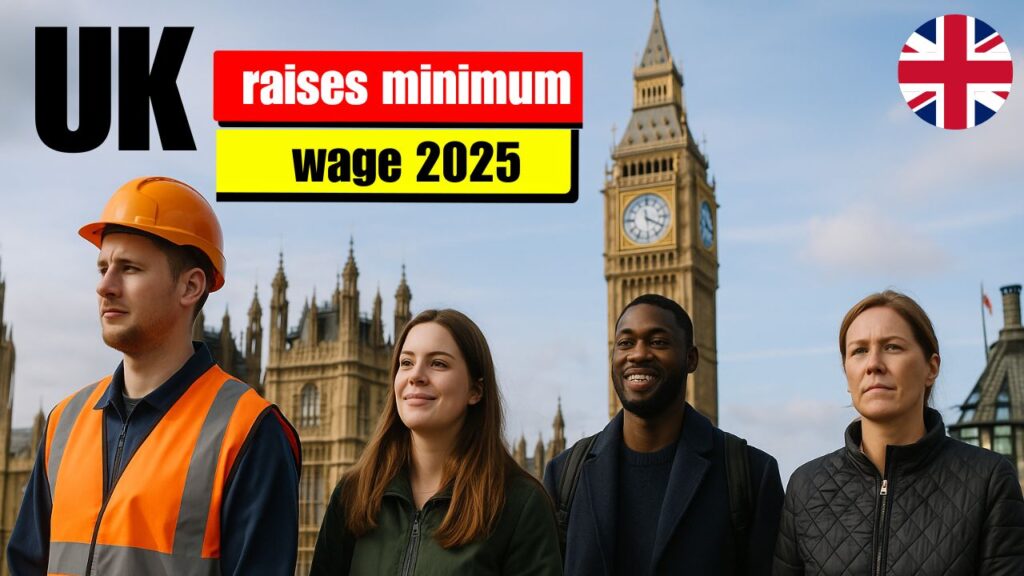The United Kingdom is preparing for a significant economic change as the government officially increases the national minimum wage from 5 November 2025. This policy will directly impact millions of workers aged 21 and above, giving them a fairer share of the country’s growing economy. Under the new rules, eligible employees will see a boost in their minimum hourly rate, helping them manage the rising cost of living. The change forms part of the UK’s ongoing effort to ensure fair pay standards and strengthen workforce equality across all sectors.

New UK Minimum Wage 2025 Explained
The updated minimum wage regulation will see employees aged 21 and older benefiting from a higher hourly pay increase. The government’s move aims to support workers amid inflation concerns and growing household expenses. From 5 November 2025, the hourly rate is expected to rise from £11.44 to a new, higher value yet to be officially confirmed. Employers across the nation are required to comply with this legal wage adjustment or face financial penalties. This step is being celebrated by trade unions and workers’ rights advocates as a positive economic reform that supports fair income distribution.
Who Qualifies for the New Wage Increase
The upcoming wage policy update applies to all employees aged 21 and above who are currently receiving the national minimum or living wage. Workers in both full-time and part-time roles will see an automatic change in their pay structure. Apprentices, young workers under 21, and those in training programs may continue to receive separate rates. Businesses are urged to review their payrolls and ensure compliance with new rules to avoid fines or audits. The new structure also encourages companies to promote workplace equality and reward experience with better compensation packages.
 UK Wage Band Changes coming 5 November - Millions of Low Paid Workers Could see Higher Earnings
UK Wage Band Changes coming 5 November - Millions of Low Paid Workers Could see Higher Earnings
Impact on UK Businesses and Economy
The minimum wage rise will undoubtedly influence business operations, particularly for small and medium-sized enterprises. Employers will need to manage higher labour costs while balancing productivity and profitability. Experts believe this move will increase consumer spending power, boosting overall economic growth across the UK. However, sectors such as retail and hospitality might experience short-term financial strain. The government has assured continued support for businesses adapting to wage regulation changes through tax reliefs and advisory schemes designed to maintain sustainable growth in the job market.
Summary and Analysis
The decision to raise the UK minimum wage represents a major shift in labour policy designed to promote fairness and financial stability. By targeting workers aged 21 and over, the government ensures that a large portion of the workforce benefits directly from higher earnings. While companies may face short-term challenges in adjusting payroll systems, the overall economic outlook remains positive. Analysts predict that increased disposable income will lead to stronger spending and job market resilience in 2025 and beyond, making this a crucial step in improving living standards nationwide.
| Age Group | Current Rate (2024) | New Rate (From Nov 2025) | Change |
|---|---|---|---|
| 21 and over | £11.44 | To be announced | Increase |
| 18–20 years | £8.60 | Likely Increase | Moderate |
| Under 18 years | £6.40 | Pending Update | Small |
| Apprentices | £6.40 | Pending Update | Small |
| Living Wage (Optional) | £12.00 | To be reviewed | Variable |
Frequently Asked Questions (FAQs)
1. When will the new minimum wage start?
The updated UK minimum wage takes effect on 5 November 2025.
2. Who qualifies for the increased wage?
All workers aged 21 and above are eligible under the new regulation.
3. Will apprentices get the same rate?
No, apprentices and younger workers have separate pay categories.
4. How will businesses adapt?
Employers must adjust payrolls and budgets to comply with the new wage law.



